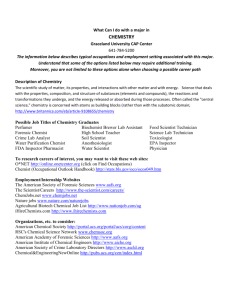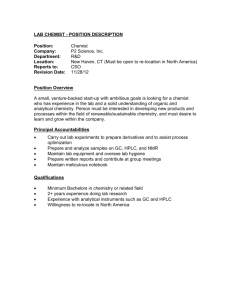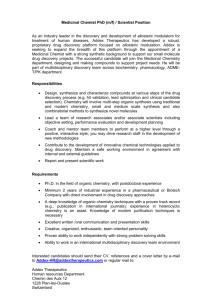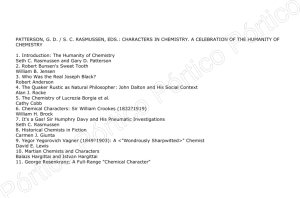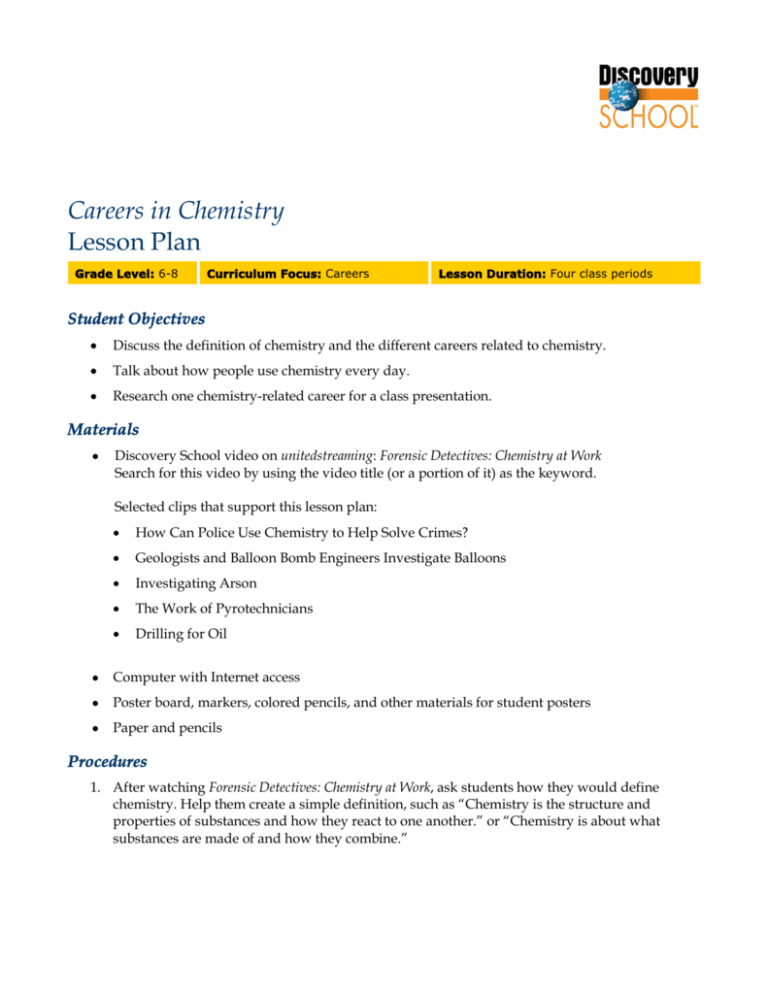
Careers in Chemistry
Lesson Plan
Grade Level: 6-8
Curriculum Focus: Careers
Lesson Duration: Four class periods
Student Objectives
Discuss the definition of chemistry and the different careers related to chemistry.
Talk about how people use chemistry every day.
Research one chemistry-related career for a class presentation.
Materials
Discovery School video on unitedstreaming: Forensic Detectives: Chemistry at Work
Search for this video by using the video title (or a portion of it) as the keyword.
Selected clips that support this lesson plan:
How Can Police Use Chemistry to Help Solve Crimes?
Geologists and Balloon Bomb Engineers Investigate Balloons
Investigating Arson
The Work of Pyrotechnicians
Drilling for Oil
Computer with Internet access
Poster board, markers, colored pencils, and other materials for student posters
Paper and pencils
Procedures
1. After watching Forensic Detectives: Chemistry at Work, ask students how they would define
chemistry. Help them create a simple definition, such as “Chemistry is the structure and
properties of substances and how they react to one another.” or “Chemistry is about what
substances are made of and how they combine.”
Careers in Chemistry
Lesson Plan
2
2. Next, ask students to describe careers that involve chemistry based on what they viewed.
Discuss what the following careers have in common. (They all deal with substances, their
properties, and how they react with each other.)
Chemists who study the properties and reactive qualities of elements
Forensic scientists who use chemical analysis to identify or match evidence from a crime
scene
Pyrotechnicians who combine chemicals that produce fireworks displays
Scientists and engineers who develop new materials
3. Tell students that chemistry is involved in many careers because chemicals are the basis for
many of the products we use every day, from drugs to synthetic fibers to perfume. Almost all
new products, from NASA spaceflight materials to new bubble-gum flavors, depend on
chemistry. Examples follow:
Chemical engineers use or make new chemicals to solve problems and find practical
applications.
Materials scientists use chemicals to discover and create new materials with unusual
properties, such as a strong lightweight metal or a plastic that can conduct electricity.
Pharmacists, doctors, and nurses use chemistry to understand how drugs interact with
the human body.
Food scientists are involved in making new ingredients or use chemistry to test food for
quality and safety.
Safety and health inspectors analyze the safety of different places, from restaurants to
water treatment plants.
4. Share the following list of chemistry-related careers with the class:
Agricultural chemist
Chemist
Chemical engineer
Chemical salesperson
Chemistry teacher or college professor
Environmental chemist
Food and flavor chemist
Forensic chemist
Geochemist (study chemicals in rocks)
Hazardous materials expert
Materials scientist
Medicinal chemist
Published by Discovery Education. © 2005. All rights reserved.
Careers in Chemistry
Lesson Plan
Pulp and paper chemist
Safety or health inspector
Textile chemist
Water chemist
5. Have students research a chemistry-related job. They may choose one listed above or another
from their own research. Have them answer the following questions:
General Questions
What is the purpose of this job?
What are some of its specific tasks?
What kind of education and experience is required?
In what kinds of places might people in this job work? (lab, outside, in an office, etc.)
In what types of companies do people with this job work?
Personal Questions
What would you like about this job?
What wouldn’t you like?
What would be most challenging?
Do you think this job is a good fit for you? Why or why not?
6. Share the following Web sites with the class. Give students at least one full class period to read
about careers and select one to explore.
Chemical Careers (list of careers, background, quotes, general information)
http://www.chemistry.org/portal/a/c/s/1/acsdisplay.html?DOC=vc2%5c3wk%5cwk3.html
A Day in the Life: Chemist
http://www.princetonreview.com/cte/profiles/dayInLife.asp?careerID=34
A Day in the Life: Chemical Engineer
http://www.princetonreview.com/cte/profiles/dayInLife.asp?careerID=33
What Do Chemical Engineers Do? (click “Job Descriptions”)
http://www.aiche.org/careers/overview.htm
Chemists and Materials Sciences
http://www.bls.gov/oco/ocos049.htm
Chemical Engineers
http://www.bls.gov/oco/ocos029.htm
Chemical and Engineering News: Career & Employment News (from flavor and
fragrance chemists to those who discover and develop drugs)
http://pubs.acs.org/cen/html/career.html
Published by Discovery Education. © 2005. All rights reserved.
3

